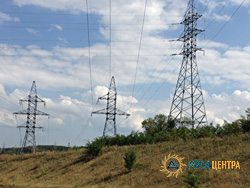
According to the statistics of IDGC of Centre — Belgorodenergo division, 1480 violations of exclusion zones of power lines were recorded in the region. More than 40% of the cases — is squatting territory, located in exclusion zones of power lines, under courtyards, garages, corrals or gardens. Other 40% of the violations were related to the illegal construction of various buildings — houses, sheds, gas stations.
This year, the power company recorded 321 violations, 264 cases have already been removed. For the rest of the facts there is work under way to identify those who have violated the rules of establishing exclusion zones of electric grid facilities that are approved by Resolution of the Russian Government of 24.02.2009 # 160, and to bring them to administrative responsibility.
One of the main causes of violations of exclusion zones of power lines is the construction of different sites within their boundaries. The volume of low-rise private buildings is increasing, shopping centres are being built, parking lots, gas stations and other infrastructure are being constructed. And not always developers take into account the requirements of the letter of the law prohibiting all types of work in exclusion zones.
There are many examples of such illegal construction on the part of legal and natural persons in the Belgorod region. In identifying such facts the owner shall be notified of the need for two weeks to carry out activities to address the violation, otherwise the case is sent to court. And there are cases when individuals and legal entities by the court decision were forced to demolish illegally built houses, garages, and foundations.
In particular, in April 2012, the Judicial Chamber of the Belgorod Regional Court issued a decision on the recognition of the garage built under the wires as unauthorized construction and required a citizen to demolish the structure at his own expense. Also, the decision was made to terminate the state registration of the garage and delete records of the ownership in the unified state register of real estate rights.
Thus, the availability of a certificate of title does not mean that the construction of different buildings in the exclusion zone does not contradict the applicable law. Many owners, realizing this, eliminate violations voluntarily. For example, a large processing plant, which had chosen to build a new facility on a land plot near a transformer substation, upon notice from the power company stopped construction and removed the foundation.
Those, who do not follow the instructions in a hurry, forget that the close proximity to an operating power facility can lead to dire consequences: from damaging power lines while executing work to harming human health and life.
More than 200 howling violations of rules of work in exclusion zones this year caused damage to power lines and power failure with consumers. Especially the problem is severe in cities. Unauthorized excavations almost always result in cables damaged, the restoration of which takes more time than conductors. A typical violation, according to experts of Belgorodenergo, is laying water pipe-lines by individuals, resulting in 2012 in damaged five high-voltage cable lines.
According to power engineers, to prevent gross violations in exclusion zones of power lines it is necessary to consider the presence of constructed within their boundaries power facilities while allocating land plots — namely, the actual passage of power lines through planned to be given plots.
The problem of squatting land in exclusion zones of power lines is no less relevant to our region. Residents in rural areas in an effort to expand their land holdings often try to use the land in the exclusion zone — for a yard, garden, house or orchard, which is illegal and unsafe. A typical squatting case occurred in the village of Bekhteevka in Korochansky district — a part of the 0.4 kV overhead line # 2 from Transformer Substation
IDGC of Centre — Belgorodenergo division warns: without the written consent of the power company it is prohibited to carry out any kind of work in the exclusion zone of power lines. Officials and citizens, who are guilty of violating the exclusion zones, may suffer both administrative and criminal liability — if considerable material damage or uncountable injury to human health and life has been caused. On all matters related to the protection of power systems you may refer via the single toll-free Power Hot Line of IDGC of Centre at
For information:
In accordance with Resolution of the Government of the Russian Federation dated 24.02.2009 # 160, exclusion zones are established along overhead power lines in the form of land plot and air space bounded by the vertical planes, separated on both sides of the lines from the extreme wires away: for power lines of 0.4 kV — 2 m, up to 20 kV — 10 m, 35 kV — 15 m, and 110 kV — 20 m.